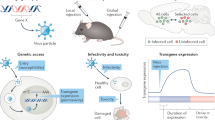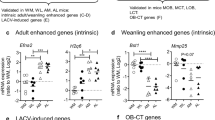Abstract
So far as is known, viruses appear to possess no enzyme activity ; the virus particles, in order to multiply, must presumably utilize the enzyme-substrate reactions of the host cells, or else have a selective affinity for the products of host metabolism. It is thus possible that an investigation of the biochemical activities of tissues containing a growing virus might disclose an abnormality of enzyme action which would yield information upon the metabolic activities of the virus itself. With this object in view, preliminary studies have been carried out upon the xanthine oxidase content of the brains of mice with yellow fever encephalitis.
This is a preview of subscription content, access via your institution
Access options
Subscribe to this journal
Receive 51 print issues and online access
$199.00 per year
only $3.90 per issue
Buy this article
- Purchase on Springer Link
- Instant access to full article PDF
Prices may be subject to local taxes which are calculated during checkout
Similar content being viewed by others
Author information
Authors and Affiliations
Rights and permissions
About this article
Cite this article
BAUER, D. Xanthine Oxidase and Virus Growth. Nature 159, 438–439 (1947). https://doi.org/10.1038/159438b0
Issue Date:
DOI: https://doi.org/10.1038/159438b0
This article is cited by
-
Zum Wirkungsmechanismus f�rdernder oder hemmender Faktoren bei Virusinfekten, insbesondere der Poliomyelitis
Acta Neurovegetativa (1957)
-
Zur Theorie provozierender und disponierender Faktoren bei der Poliomyelitis
Klinische Wochenschrift (1956)
-
The role of Naja flava toxoid and toxin in experimental poliomyelitis
Acta Neurovegetativa (1954)
-
Multiplication of the Animal Viruses
Nature (1949)
-
Association of Xanthine Oxidase with Virus Multiplication
Nature (1948)
Comments
By submitting a comment you agree to abide by our Terms and Community Guidelines. If you find something abusive or that does not comply with our terms or guidelines please flag it as inappropriate.



